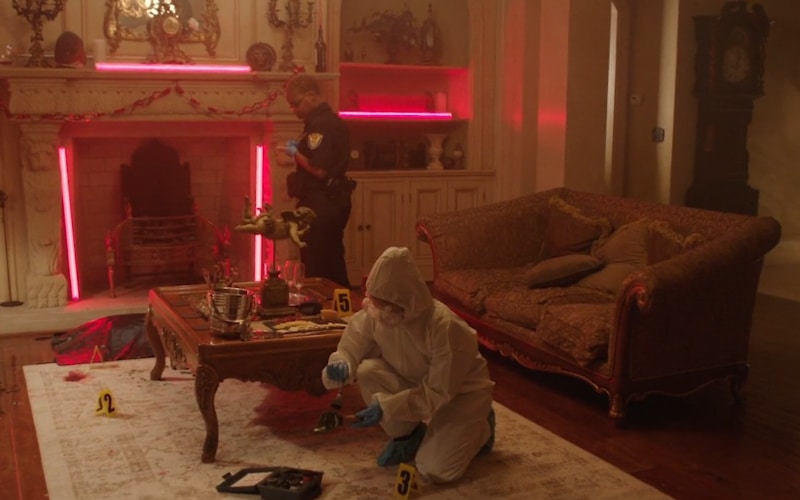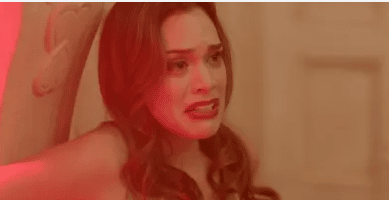
Most Horrible Things starts at the end, or thereabouts. Here is a grand house party gone wrong, all blood splatter, discarded underwear and – body bags. We also hear a 911 call, alongside seeing police and scenes of crime moving through the property. Clearly, this party has ended… interestingly. Starting a film like this, well, it’s a risk: by a couple of minutes in we know, broadly, that bad things have happened, and now we have to hope against hope that the narrative which gets us to this point (and, as usual, just beyond it) justifies the reveal. Sadly, you’d be hard pressed to say that it does.
Having established than a lot of people are already goners, we are taken back to the beginning of the evening – where you can, if you fancy, play a game of Guess Who’s Dead – where a group of six bright young things are arriving at the house in their finery. Things kick off with a chap in drag miming to a disco track, and though the simpletons at the gate are delighted with this performance, we see a different side of it: the performer, when the song is over, retreats to another room, seemingly distressed. The film sticks with this distress for rather too long, by the by, which is the first clue that plot-building might be a tad dilute. But anyway, the until-now strangers get to know one another, share a selfie (hip and happening film klaxon, number one) and ponder what’s about to happen. It seems that they have been invited to attend a special Valentine’s Day dinner here: at the behest of a surprisingly hirsute butler (Simon Phillips) they then sign waivers and hand over their phones. This being done, they await their host, and wouldn’t you know it, it’s the drag performer from earlier on. How to define him…He’s handsy, he’s given to cod philosophising and he wants to set personal challenges for each guest. If they pass, they each receive the hefty sum of money agreed. What could go wrong?
An early issue here – not quite as early as revealing that most of the cast are already dead, but not long after – relates to the ‘romance’ aspect of the plot. In fairness, it seems fairly unclear to the characters, so it’s no great surprise that it feels a little thinly plotted for the audience. It’s Valentine’s Day, a day which, as we know, has somehow turned into an oddball celebration (or commiseration) on love. The guests seem to think that their evening is going to be romance-themed; indeed, this film, under its first title Love Hurts, had its first release on 14th February, and I’d imagine a few dates ended angrily as a result. But love doesn’t quite take root as a theme; there’s too much script, too little plausible chemistry, and a tendency to dip in and out of two timelines, present, and future – where the police are interviewing the survivors. Whilst this is probably intended as a means of backfilling the plot, it really just takes us out of the moment and then lobs us back in again. It jerks forward at different rates, like the handrail on an escalator. As a result, ‘love’ never really feels relevant, despite the attempts to keep it so.
The film devotes far too much time to chit-chat, in any case. Some of this comes from our host (Sean Sprawling), a strangely glassy-eyed fellow, like someone who badly needs glasses, but has taken them off for a special occasion for reasons of vanity. He is meant to seem like a person presiding over events, albeit not quite confidently, and not just because of the eyes thing: as a master of ceremonies, he’s just a little too self-involved. To be fair, though, his guests won’t shut up and develop as characters, which can’t help. They regurgitate buzzwords and unconvincing discourse about veganism, racism, sustainability, carbs, and so on. No wonder they’re single. Possibly intended as a shortcut to making us care about them and see them as a modern bunch, this clanking banter fails because it instead makes them look like fairly obnoxious, two-dimensional representatives of recognisable, sure, but tedious conversations. Again, it takes us out of the here-and-now as we wait for it to end. This lot badly needs some more plausible pressure, and we need to see it steadily unfold. Without it, we’re just killing time waiting for the killings.
These kinds of social experiments can make for good cinema – consider Panic Button (2011) – but here, it unfortunately lacks in the right kind of writing, and flounders early. Most Horrible Things lacks the psychological weight to see it through, ultimately, and instead dandles some bit-part players in a regrettable situation.
Most Horrible Things (2022) will be released on 14th November 2022.
